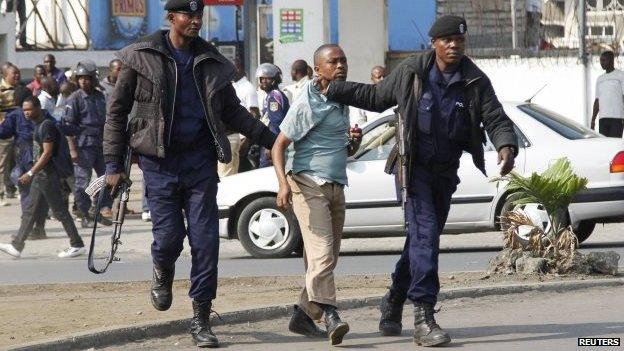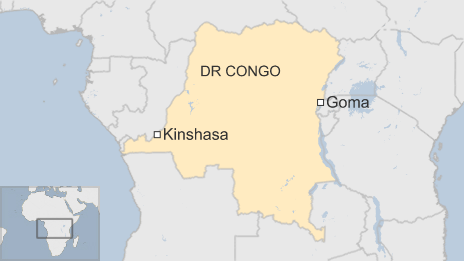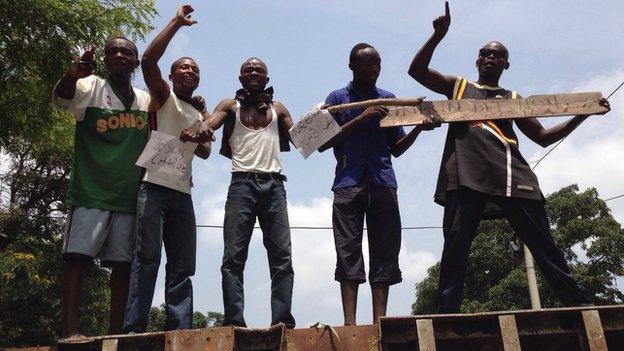DR Congo senate delays vote amid anti-Kabila protests
- Published
The BBC's Maud Jullien reports on days of violent clashes
The Democratic Republic of Congo senate has delayed a vote on a national census which has sparked violent protests because it would delay elections.
Clashes continued on Thursday in the eastern city of Goma, with police reportedly firing live ammunition.
Human rights organisations say dozens have been killed, although this is disputed by the government.
Protesters say the plan is a move to ensure President Joseph Kabila extends his time in office.
The BBC's Maud Jullien in the capital, Kinshasa, says mobile internet and text services have been cut although fixed-line internet connections have been restored.

People were detained in Goma during protests which began on Monday
She says the capital is largely quiet, although the university has been sealed off after three days of violent protests.
Many senators have said they oppose the bill as it stands, so our correspondent says it might be amended to allow elections to be held before the census is conducted.
Clashes in Goma were reported at Katindo military camp, at the vice governor's office and several other districts of the city on Thursday.
Protesters erected barricades with burning tyres and threw stones while the security forces shot into the air and used tear gas.
One witness said presidential guards, who are not normally assigned to manage protests, supported the police.

Officials at one of Kinshasa's main public hospitals have told the BBC that the presidential guard entered the hospital on Wednesday after opposition members came to visit injured protesters.
The guards began shooting inside the hospital, they said, leaving three visitors wounded.
The government denies that police have used live ammunition and says that in addition to a policeman, 11 looters have been killed by private security guards.
'Constitutional coup'
Mr Kabila first took power in 2001 following the assassination of his father Laurent, who was president at the time, and is constitutionally barred from running for another term.

Kinshasa is seen as an opposition stronghold
The opposition say the census is a ploy for him to hang on to power as it will take about three years for it to be conducted in DR Congo, which is two-thirds of the size of western Europe, has very little infrastructure and is hit by instability in the east.
The government admits the election could be delayed, but says the census is vital to ensure polls are free and fair.
On Wednesday, the Catholic Church, the largest in DR Congo, called on people to peacefully oppose the move.
It also shut its schools because of the violent protests in the capital, Kinshasa,
Senators say they need more time to consider the law paving the way for a census and the vote will now be held on Friday.
The lower chamber, the House of Representatives, approved the plan for a census on Saturday, in a vote boycotted by opposition MPs.
The opposition says this amounts to a "constitutional coup" by Mr Kabila.
DR Congo, formerly known as Zaire, has never had a reliable census since independence from Belgium in 1960.